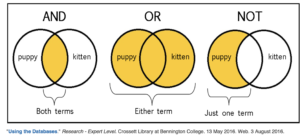Nonetheless, You Must Learn To Write Great Prompts Now!
If you wanted to search for information when Google was launched in 1998, you had to know how to use Boolean search operators, which were created in the early 19th century by an English mathematician named George Boole.
 You had to know how to include the words and symbols for what you did and did not want in your search results. Boolean terms included AND, OR, NOT, brackets and more throughout your search query.
You had to know how to include the words and symbols for what you did and did not want in your search results. Boolean terms included AND, OR, NOT, brackets and more throughout your search query.
All these years later, Boolean search is still the foundation of search engines, and every programming language, but now you don’t need to learn Boolean algebraic formulas.
Natural language (NLP) replaced Boolean logic, even though it’s still operating behind the scenes. NLP makes it possible for search engines to understand the meaning of words, sentences and texts to generate information, knowledge or new text. Unsurprisingly, average computer users really didn’t want to learn complex formulas.
They still don’t.
Fast forward to 2023 when, as if by lightning strike, generative AI platform ChatGPT, went viral. It can not only understand natural language, it also can perform many marketing functions that boost results.
The caveat: you need to learn how to create complex “prompts” to tell ChatGPT and other #GenerativeAI platforms what to write and how to write it.
The More Things Change…
AI is forcing marketers and just about everyone who creates content to learn the new query formula called a “prompt.” These are natural language instructions to the AI, telling it what you want it to do. Prompts set the tone, style, voice, facts and other components of the search the platform will use to create its response to a query.
AI systems are trained on massive amounts of text and image data to understand and generate human language. As McKinsey’s new report on generative AIexplains, “Generative artificial intelligence (AI) describes algorithms (such as ChatGPT) that, when prompted, can be used to create new content, including audio, code, images, text, simulations, and videos. Recent breakthroughs in the field have the potential to drastically change the way we approach content creation.”
Drastic changes in the way we’ll work
Prompts get ChatGPT, Claude.ai, Bing, Bard, Perplexity, Character, Pi, Jasper, Notion, You.com and others to create content you want. If your prompts are not exacting enough, you risk having the AI platform hallucinate (totally make things up) information that doesn’t actually exist.
With the right prompts, AI can – in a matter of seconds – forecast things like future sales, identify customers at risk of churning, optimize pricing strategies, and determine which marketing channels drive the best ROI.
While writing prompts may seem daunting, AI will soon impact most jobs and the time to preserve yours is now. Matt Burney, a talent strategy adviser at the careers website Indeed, says “Experience of using a large language model or generative pretrained transformer is going to be a requirement for pretty much every office-based job.”
Don’t worry: the need for prompts is temporary
 Does this all seem hopelessly complicated? Fret not!
Does this all seem hopelessly complicated? Fret not!
But don’t worry – prompt writing will soon go the way of Boolean Search, working behind the scenes. Just as search works with natural language queries, I am certain that AI platforms soon will eliminate the need for prompts.
Instead of forcing users to spend hours (or days) learning to write effective prompts, Big Tech soon will seamlessly integrate prompts into AI platforms – therefore simplifying our use of AI.
Given the pace at which generative AI is developing, that could have today’s prompt engineers asking “Would you like fries with that?”
Smart prompts
You’ll need to learn how to prompt each AI Platform to do its best work. Journey, DALL-E and other image creation AI platforms require more complex and detailed prompts than those that only handle words.
If you are not specific enough, and just prompt “Write a blog post about marketing,” you’ll be likely to get a rambling, long post that could include some made-up facts and a lot of hot air.
If, instead, you prompt: “You are a CMO at a digital agency. This post is intended to be of interest to founders of funded startups. Write a 400-word blog post explaining how to write an effective AI prompt. Use short sentences and paragraphs and incorporate bulleted lists. Be sure to explain the difference between a bad and a good prompt.”
In this example, you have told the AI:
- Who’s writing
- Who is the audience (persona)
- What you are writing about
- Points you want to stress
- Writing style, length and tone (conversational, journalistic, academic)
Here’s what Claude.ai produced in seconds with that prompt:
How to Write an Effective AI Prompt
Writing a good prompt is crucial to getting helpful AI responses. Crafting the right AI prompt can be a game-changer, enabling your business to perform complex tasks, derive insights, and even interact with customers. But how can you write a prompt that gets you the results you need?
- Know what you want. Have a clear goal for the AI. Vague prompts produce vague responses.
- Use simple language. Use short, clear sentences and paragraphs. Avoid jargon.
- Provide context. Give the AI background info to work from. But keep context brief—1-3 sentences.
- Ask a specific question. Don’t just describe a problem.
- Avoid assumptions. Don’t impose human values or make unsupported claims. Stick to neutral facts.
- Check for errors. Proofread prompts to fix typos, grammar issues. Accurate input produces accurate output.
- Iterate if needed. If an AI response is off, rephrase the prompt for clarity.
Claude’s Bad Prompt Example
“I need to make a logo that will appeal to all customers and make my brand look prestigious and cutting-edge. Use lots of cool effects”
This prompt has multiple issues:
- Vague goal: “make my brand look prestigious”
- Unclear request: “use lots of cool effects”
- Asks for subjective things: “cutting edge,” “cool effects”
The more specifics or context you provide in the prompt, the more likely you are to get useful responses. The key is to be specific, direct and focused on providing facts and details instead of leaving interpretation up to the AI.
It’s also a good practice to ask the AI “is there any way I can make this post more clear?” or “Have I missed any important points in this post?”
If you’re lucky, the answer will be the one Claude.ai gave me the other day. “Good job!” it told me. :)
B.L. Ochman specializes in marketing transformations. Let me help your agency or company get up to speed on how to use AI to supercharge your marketing.








